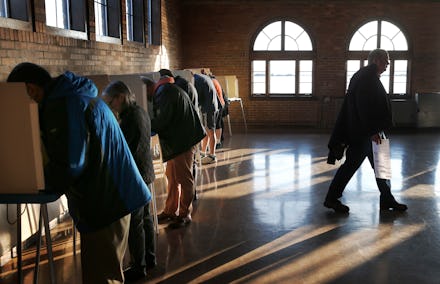Millennial and Minority Voters in Wisconsin Face Huge Obstacles at the Polls

Historically, Wisconsin has been a paragon of voter participation. The state's been a pioneer of Election Day registration and consistently boasted exceptionally high voter turnout.
But as of Tuesday, that special status could be fading.
Thanks to a new voter ID law passed by Republicans in 2011 that takes effect for the first time at the state's presidential primary on Tuesday, an estimated 9% of the state's electorate — those without a government-issued photo ID — are at risk of being unable to vote, according to the Nation.
As of Tuesday afternoon, there were already signs that voters were scrambling to meet the new requirements.
Read more: New Report Shows Millennial and Minority Voters Face Huge Obstacles at the Polls
MSNBC correspondent Jacob Soboroff reported that at the University of Wisconsin-Madison, the line for students to get special university-sponsored voter IDs was longer than the line to vote at the polls.
Some students were lining up for IDs even though they had driver's licenses, because out-of-state students cannot vote with non-Wisconsin driver's licenses.
"The issue is not whether or not Bernie [Sanders] or Hillary [Clinton] are going to win whether these students are going to be able to vote for them," Soboroff said on MSNBC.
Election officials said the long lines at at least one other poll site were due to the new ID requirements. MSNBC's Tony Dokoupil reported that at one station in Green Bay there was a wait of over an hour to vote, but that only two of the 10 voting booths were in use. He said there was a "bottleneck at check-in."
Young people aren't the only voters who are particularly vulnerable to being disenfranchised by the new law. Black and Latino voters — who are disproportionately likely to lack required ID or have more difficulty accessing or paying for a new one — are more likely to be barred from the polls on Tuesday.
The Nation reports that in 2012, "African-American voters in Wisconsin were 1.7 times as likely as white voters to lack a driver's license or state photo ID, and Latino voters were 2.6 times as likely as white voters to lack such ID. More than 60% of people who've requested a photo ID for voting from the DMV have been black or Hispanic, according to legal filings."
Given that there's no real evidence of voter fraud in Wisconsin, the new law seems poised to prevent more legitimate votes than illegitimate ones.